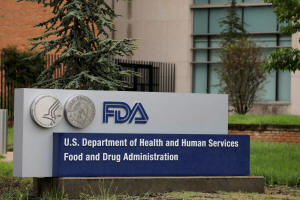U.S. FDA greenlights Provention Bio's diabetes drug
 Send a link to a friend
Send a link to a friend
 [November 18, 2022]
By Bhanvi Satija [November 18, 2022]
By Bhanvi Satija
(Reuters) - Provention Bio said on Thursday
the U.S. Food and Drug Administration had approved the use of its drug
teplizumab in those aged eight years and older, the first treatment
aimed at delaying the onset of insulin-dependent type 1 diabetes.
The U.S. health regulator has allowed teplizumab, to be sold under the
brand name Tzield, for patients with stage 2 of the disease who have two
or more disease autoantibodies and abnormality in blood sugar stability,
Provention Bio said.
"We expect to have drug in the channel by the end of the year," said
Jason Hoitt, Provention's chief commercial officer, adding that
preparations were underway with its partner Sanofi for a full launch in
January 2023.
In October, Provention signed a co-promotion deal for the drug with
Sanofi, offering the French drugmaker first negotiation for exclusive
global rights to commercialize the drug in exchange for an upfront
payment of $20 million.
"We expect that there is a greater value of teplizumab beyond this
indication and hope for a broader collaboration with Provention in the
future," said Olivier Bogillot, Sanofi's head of U.S. General Medicines.

[to top of second column]
|

Signage is seen outside of the Food and
Drug Administration (FDA) headquarters in White Oak, Maryland, U.S.,
August 29, 2020. REUTERS/Andrew Kelly/File Photo
 As per the deal, the approval will
also allow Sanofi to purchase up to $35 million of Provention's
common stock.
Current standard of care for type 1 diabetes requires patients to
monitor and manage symptoms such as low or high blood sugar levels
through regular insulin intake.
The injectable drug, for which Provention acquired rights from
MacroGenics Inc in 2018, is a monoclonal antibody that suppresses
the body’s immune response and allows it to produce insulin for
longer, thereby delaying the onset of type 1 diabetes.
Type 1 diabetes, previously known as juvenile diabetes, is a disease
in which the immune system attacks and destroys the
insulin-producing beta cells in the pancreas, leaving sufferers
reliant on regular insulin injections.
(Reporting by Bhanvi Satija and Nandhini Srinivasan in Bengaluru;
Editing by Vinay Dwivedi and Maju Samuel)
[© 2022 Thomson Reuters. All rights
reserved.] This material may not be published,
broadcast, rewritten or redistributed.
Thompson Reuters is solely responsible for this content. |